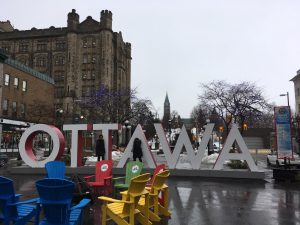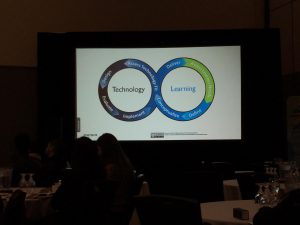Search the Archives
Categories
OER Francophone Conference
By: Frédéric Jubinville, USB for The Spotlight

 On February 21st, 2018, in our great nation’s capital, eCampusOntario put together the first francophone conference on open educational resources (OERs) to promote, educate and collaborate between educational institutions, and start a solid conversation on this highly beneficial concept. I was privileged to have been sponsored by Campus Manitoba, as well as my colleague Daniel Beaulieu (Librarian), to attend this first time event and see the potential of OERs.
On February 21st, 2018, in our great nation’s capital, eCampusOntario put together the first francophone conference on open educational resources (OERs) to promote, educate and collaborate between educational institutions, and start a solid conversation on this highly beneficial concept. I was privileged to have been sponsored by Campus Manitoba, as well as my colleague Daniel Beaulieu (Librarian), to attend this first time event and see the potential of OERs.
The idea is to encourage authors and content creators to use the different degrees of the Creative Commons categories, to allow use of resources, and to support availability of resources for students following post-secondary courses. Most people might think that this is an idea to take money away from authors and is less beneficial to them, but in fact, authors don’t often see the recognition or degree of fame when each of their works only bring in a fraction of cost as profit. Recognition is much more tangible once the work is easily accessible, which was a key point during most of the presentations that were offered during the conference.
The conference began with the main organizer, Michel Singh (Collège LaCité), who thanked everyone for being there and started the conference by inviting a woman representing the First Nations to begin by welcoming all participants. Accessibility and inclusion were very evident with this opening ceremony, as well as language kits for live translation between English or French speakers at all times. It was quite evident that this wasn’t simply a conference about how to work together; it was a conference that proved that we can work together, regardless of culture creed or language.
The opening ceremonies were followed by the first main speaker, Mr. David Porter, Chief Executive Officer at eCampusOntario, who spoke of the importance and the initiatives that the conference and his group are hoping to achieve in Ontario, following the example of OER at BCcampus which was the first open educational resources in Canada.
Following Mr. Porter was Mr. Nicolas Boivin, Professor at l’Université du Québec in Trois-Rivières, who wholeheartedly promotes public domain material. He explained how open resources were more than just a way for students to save on class material, but even more beneficial to authors and editors who wish to gain more visibility and recognition for their work. In the big picture he  had said that “Prioritizing of knowledge dissemination is key!” Any author hoping to gain a fortune through his/her work may wait a lifetime to make it big when every book may only bring in a few dollars profit. The end goal is to educate, offering well-presented knowledge which will offer students a brighter path, as well as offering authors with much more visibility for years to come. The main focus he expressed several times was the fact that his salary was paid by public funds, and so the work he has published or offered should be offered back to the general public, since they were the people paying his salary. A very good assessment and a very humbling presentation showed an ideal that promotes working for others in a remarkable way.
had said that “Prioritizing of knowledge dissemination is key!” Any author hoping to gain a fortune through his/her work may wait a lifetime to make it big when every book may only bring in a few dollars profit. The end goal is to educate, offering well-presented knowledge which will offer students a brighter path, as well as offering authors with much more visibility for years to come. The main focus he expressed several times was the fact that his salary was paid by public funds, and so the work he has published or offered should be offered back to the general public, since they were the people paying his salary. A very good assessment and a very humbling presentation showed an ideal that promotes working for others in a remarkable way.
We had a choice of three workshops in the morning, followed by the main speakers, and two more sets of three workshops in the afternoon. Topics for the workshops varied from the focus of OERs in Ontario and Quebec, open library concepts, introduction to open creation platforms such as Pressbooks, to defining Creative Commons rules and how to create your own institutional OER policies. Each speaker was well-versed in their own field. The workshops were roughly 30 minutes long, which offered a lighter overview of every topic that was addressed.
There was an enormous amount of information to take in for a single conference, and I personally think that there may be enough material to offer several days for the future of this concept.
The day ended with a shorter closing panel of about 20 minutes which included Bruno Poellhuber, Director of Staff Support in Technologies at the Université de Montréal, David Larocque, Instructor in Multimedia Communications at Université de Saint-Boniface, and Michel Singh, Consultant at la Cité in Ottawa. It may have been a shorter discussion, but it definitely left the crowd wanting to know more about the potential and future of Open Educational Resources.
As the very first francophone conference on this topic, it certainly opened doors to possibilities that would benefit today’s society. The ideals of a person’s rights on his/her own work was always sustained, yet the potential to create a better learning environment for the general public was something that seems much more tangible because of the work that these professionals were promoting during this conference. I know this is just the beginning of something that may very well revolutionize the pedagogical platform for years to come.
About The Spotlight
At Campus Manitoba, we support post-secondary initiatives and events that foster collaboration, expand access, and cultivate an open culture. Our partners, and colleagues are at the centre of this work and we want them to share their story. You’ll find them here at The Spotlight.
Share The News
Other Recent Stories
Manitoba Post-Secondary News Roundup
UWinnipeg offers official digital documents through MyCreds™ | The University of Winnipeg The University of Winnipeg introduces MyCreds, [...]
Building Capacity for Open in Manitoba with the Rebus Foundation Textbook Success Program
Are open textbooks worth it? The financial benefits of open educational resources are easy to quantify: 22,447 students in [...]
Black History Month in Manitoba
Recognized on December 14, 1995, Black History Month invites all of us to celebrate the numerous achievements and contributions [...]
Our Platforms
Access to education is at the heart of everything we do.
Here are the ways we work to make learning accessible in Manitoba.

eCourses is your resource for online learning in Manitoba, providing flexible pathways for you to achieve your academic or career goals. With more than 1,200 courses to choose from, you can craft an education that works best for you. Our Virtual Help Desk is here to help you navigate through courses from across Manitoba’s post-secondary institutions.

Home to more than 380 open educational resources (OERs), the Manitoba Open Education Initiative provides support to help you (as a faculty member) review, adapt and adopt open textbooks. If you’re a student, browse our collection of open textbooks that you can read, download or print for free.




